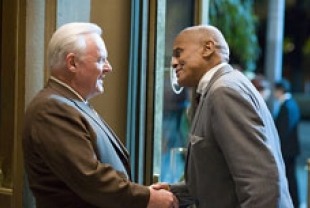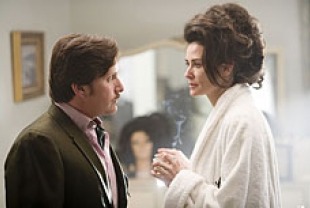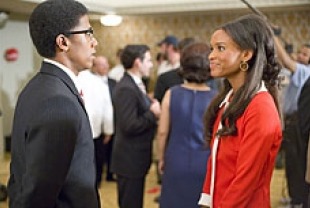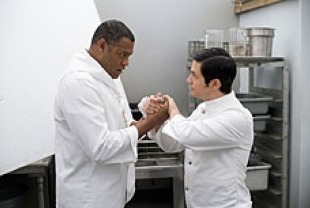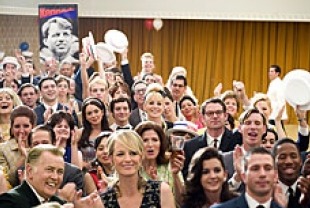"Robert Kennedy's relationship to his age makes him, I believe, a 'representative man' in Emerson's phrase — one who embodies the consciousness of an epoch, who perceives things in fresh lights and new connections, who exhibits unsuspected possibilities of purpose and action to his contemporaries," Pulitzer Prize-winning historian Arthur M. Schlesinger has written. Bobby, as he was known, had served as Attorney General in President John Kennedy's administration. After his brother was assassinated, Bobby was elected Senator from New York. In 1968, he ran for president, a campaign in which he came to embody the hopes and dreams of thousands of Americans. After winning the California primary, he and his team were celebrating at the Ambassador Hotel in Los Angeles. He was shot while leaving the party through the kitchen and later died.
Emilio Estevez has made a poignant and soul-stirring film about the hopes, dreams, anger, and righteous indignation of those who saw in Robert Kennedy a catalyst for justice, change, and peace in America. The story focuses on the guests and the staff in the Ambassador Hotel on that fateful night when violence again reared its ugly head in America. Historical footage of his campaigning and clips from his speeches reveal Bobby as a courageous and visionary man who was outlining new directions for a nation torn asunder by the war in Vietnam, racism, and the gap between the rich and the poor.
At one point in his career, Robert Kennedy said, "The adventure of change may be a tragic adventure for many — a sad uprooting of cherished customs and institutions. Yet change is the one constant of history. Not a decade has gone by in our nation's history in which we did not undergo new experiences and seek new challenges." Through brief glimpses into the lives of 22 characters, writer and director Estevez presents some of the changes that rocked the 1960s. Although some people regard this decade as a sad uprooting, a disastrous derailment from the proper course of American history, others remember those years as a golden age of creative energy and youthful idealism which set off new possibilities in both public and private life. The ensemble performances of a stellar cast of actors and actresses in Bobby open up these changes in imaginative ways.
The Ambassador Hotel in Los Angeles has been chosen to host the closing stages of Robert Kennedy's campaign to achieve the 1968 Democratic presidential nomination. He is scheduled to give a speech there and a party if he wins the California primary. Kennedy has by now become known for his espousal of the needs and rights of the poor and his support among blacks, Hispanics, and youth. These groups are all represented in the film.
In the kitchen of the hotel, busboy Jose (Freddy Rodriguez) is upset because he has been assigned a double shift on the night that Dodgers pitcher Don Drysdale is trying to break a record, and he has tickets to the game. In an act of kindness, he gives the tickets to the chef, Edward (Laurence Fishburne), who in a magical screen moment links Jose's generosity to the chivalrous deeds of the Knights of the Roundtable.
Over lunch, Miguel (Jacob Vargas), an angry Mexican-American squares off against Edward over what he considers to be injustices suffered by Hispanics. Another angry man is Kennedy aide Dwayne (Nick Cannon), an African-American whose commitment to ending racism has earned him a special meeting with the New York Senator; he shares his feelings with a black woman (Joy Bryant) who works on the hotel's switchboard. A final frustrated person is Lenka (Svetlana Metkina), a Czech journalist who is desperately trying to get an interview with Kennedy from his campaign aide Wade (Joshua Jackson).
When hotel manager Paul Ebbers (William A. Macy), a liberal, finds out that his racist kitchen manager Timmons (Christian Slater) has not given the staff time off to vote, he fires him. However, this smarmy young man gets revenge by telling Ebbers' wife Miriam (Sharon Stone), the hotel's beautician, that her husband is having an affair with Angela (Heather Graham), a switchboard operator. The sexual revolution of the 60s has had a dire effect on the stability of other marriages as well. Virginia Fallon (Demi Moore), a singer who is scheduled to introduced Kennedy at the party, is an alcoholic whose husband Tim (Emilio Estevez) is fed up with her self-destructiveness. Also not relating very well are Jack (Martin Sheen), an East coast socialite whose depression has put a damper on his relationship with his younger wife Samantha (Helen Hunt).
One of the many cultural developments of the 1960s was the experimentation of many youth with drugs. Two worn-out Kennedy volunteers (Brian Geraghty and Shia LeBeouf) come under the influence of a hippie (Ashton Kutcher) who introduces them to LSD and promises an encounter with God. Susan (Mary Elizabeth Winstead), a coffee shop waitress, cannot believe the gullibility of these two young men.
Another person who embodies the idealism that was so rampant in the counter-culture is Diane (Lindsay Lohan), who is going against her own family to marry William (Elijah Wood) in order to save him from being sent to Vietnam. In a youth-oriented culture, the elders feel quite out of place and adrift. John Casey (Anthony Hopkins), a retired doorman, spends time playing chess and reminiscing about all the famous people he met down through the years at the Ambassador. His friend Nelson (Harry Belafonte) is losing his memory and rails against the meaningless of his life without work.
The closing scenes of Bobby depict the assassination of Kenney and bring together all of the characters in the drama. Estevez brilliantly uses Kennedy's speech on the "mindless menace of violence" (given after the assassination of Dr. Martin Luther King, Jr.) and the song "The Sounds of Silence" by Simon and Garfunkel to capture and convey the shock of the evening and the violence that took away another great American leader advocating change. In the ballroom and the kitchen, all the yearning segments of American population are represented.
Robert F. Kennedy once stated: "Let no one be discouraged by the belief there is nothing one man or woman can do against the enormous array of the world's ills — against misery and ignorance, injustice and violence. . . . Few will have the greatness to bend history itself; but each of us can work to change a small portion of events, and in the total of all those acts will be written the history of this generation." Watch the screen carefully in the chaotic aftermath of the assassination and you will see an act of mercy and love that will touch your heart and reveal the authenticity of Robert Kennedy's words.
